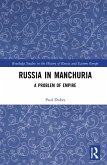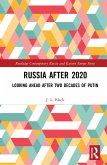Punk culture is currently having a revival worldwide and is poised to extend and mutate even more as youth unemployment and youth alienation increase in many countries of the world. In Russia, its power to have an impact and to shock is well illustrated by the state response to activist collective and punk band Pussy Riot. This book, based on extensive original research, examines the nature of punk culture in contemporary Russia. It explores the vibrant punk music scenes and the social relations underpinning them in three contrasting Russian cities. It relates punk to wider contemporary culture and uses the Russian example to discuss more generally what constitutes 'punk' today.
Hinweis: Dieser Artikel kann nur an eine deutsche Lieferadresse ausgeliefert werden.
Hinweis: Dieser Artikel kann nur an eine deutsche Lieferadresse ausgeliefert werden.
"We can confidently say that the ethnographies here support the general anthropological positions that culture is locally (in place and time) constructed, embodied, contested, and unstable, with no timeless 'essence' but only specific shifting formations. Bringing these insights to Russia and to music is a worthwhile task that scholars and students alike should find enlightening." Jack David Eller Anthropology Review Database








